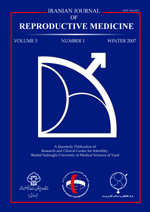
|
International Journal of Reproductive BioMedicine
Research and Clinical Center for Infertility, Shahid Sadoughi University of Medical Sciences of Yazd
ISSN: 1680-6433
EISSN: 1680-6433
Vol. 9, No. 2, 2011, pp. 77-82
|
 Bioline Code: rm11012
Bioline Code: rm11012
Full paper language: English
Document type: Research Article
Document available free of charge
|
|
|
International Journal of Reproductive BioMedicine, Vol. 9, No. 2, 2011, pp. 77-82
| en |
Observing principles of medical ethics during family planning services at Tehran urban healthcare centers in 2007
Motevallizadeh, Saeed; Afzali, Hossein Malek & Larijani, Bagher
Abstract
Background: Family planning has been defined in the framework of mothers and children plan as one of Primary Healthcare (PHC) details. Besides quantity, the quality of services, particularly in terms of ethics, such as observing individuals’ privacy, is of great importance in offering family planning services.
Objective: A preliminary study to gather information about the degree of medical ethics offered during family planning services at Tehran urban healthcare centers.
Materials and Methods: A questionnaire was designed for study. In the first question regarding informed consent, 47 clients who were advised about various contraception methods were asked whether advantages and disadvantages of the contraceptive methods have been discussed by the service provider. Then a certain rank was measured for either client or method in 2007. Finally, average value of advantage and disadvantage for each method was measured. In questions about autonomy, justice and beneficence, yes/no answers have been expected and measured accordingly.
Results: Health care providers have stressed more on the advantages of pills and disadvantages of tubectomy and have paid less attention to advantages of injection ampoules and disadvantages of pills in first time clients. While they have stressed more on the advantages and disadvantages of tubectomy and less attention to advantages of condom and disadvantages of vasectomy in second time clients. Clients divulged their 100% satisfaction in terms of observing turns and free charges services.
Observance degree of autonomy was 64.7% and 77.3% for first time and second- time clients respectively.
Conclusion: Applying the consultant’s personal viewpoint for selecting a method will breach an informed consent for first and second time clients. System has good consideration to justice and no malfeasance.
Keywords
Principles of ethics, Family planning, Client’s rights
|
| |
© Copyright 2011 - Iranian Journal of Reproductive Medicine
Alternative site location: http://www.ijrm.ir
|
|
